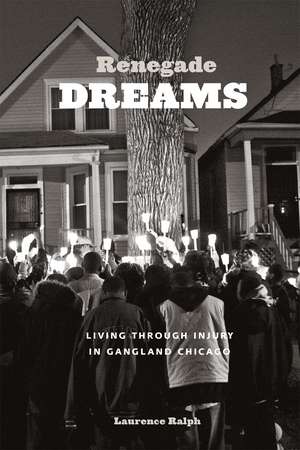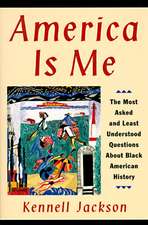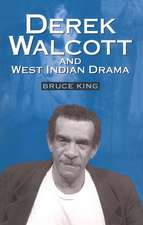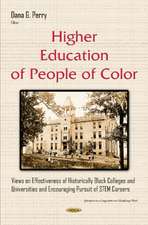Renegade Dreams: Living through Injury in Gangland Chicago
Autor Laurence Ralphen Limba Engleză Paperback – 15 sep 2014
Every morning Chicagoans wake up to the same stark headlines that read like some macabre score: “13 shot, 4 dead overnight across the city,” and nearly every morning the same elision occurs: what of the nine other victims? As with war, much of our focus on inner-city violence is on the death toll, but the reality is that far more victims live to see another day and must cope with their injuries—both physical and psychological—for the rest of their lives. Renegade Dreams is their story. Walking the streets of one of Chicago’s most violent neighborhoods—where the local gang has been active for more than fifty years—Laurence Ralph talks with people whose lives are irrecoverably damaged, seeking to understand how they cope and how they can be better helped.
Going deep into a West Side neighborhood most Chicagoans only know from news reports—a place where children have been shot just for crossing the wrong street—Ralph unearths the fragile humanity that fights to stay alive there, to thrive, against all odds. He talks to mothers, grandmothers, and pastors, to activists and gang leaders, to the maimed and the hopeful, to aspiring rappers, athletes, or those who simply want safe passage to school or a steady job. Gangland Chicago, he shows, is as complicated as ever. It’s not just a warzone but a community, a place where people’s dreams are projected against the backdrop of unemployment, dilapidated housing, incarceration, addiction, and disease, the many hallmarks of urban poverty that harden like so many scars in their lives. Recounting their stories, he wrestles with what it means to be an outsider in a place like this, whether or not his attempt to understand, to help, might not in fact inflict its own damage. Ultimately he shows that the many injuries these people carry—like dreams—are a crucial form of resilience, and that we should all think about the ghetto differently, not as an abandoned island of unmitigated violence and its helpless victims but as a neighborhood, full of homes, as a part of the larger society in which we all live, together, among one another.
Going deep into a West Side neighborhood most Chicagoans only know from news reports—a place where children have been shot just for crossing the wrong street—Ralph unearths the fragile humanity that fights to stay alive there, to thrive, against all odds. He talks to mothers, grandmothers, and pastors, to activists and gang leaders, to the maimed and the hopeful, to aspiring rappers, athletes, or those who simply want safe passage to school or a steady job. Gangland Chicago, he shows, is as complicated as ever. It’s not just a warzone but a community, a place where people’s dreams are projected against the backdrop of unemployment, dilapidated housing, incarceration, addiction, and disease, the many hallmarks of urban poverty that harden like so many scars in their lives. Recounting their stories, he wrestles with what it means to be an outsider in a place like this, whether or not his attempt to understand, to help, might not in fact inflict its own damage. Ultimately he shows that the many injuries these people carry—like dreams—are a crucial form of resilience, and that we should all think about the ghetto differently, not as an abandoned island of unmitigated violence and its helpless victims but as a neighborhood, full of homes, as a part of the larger society in which we all live, together, among one another.
Preț: 176.63 lei
Nou
Puncte Express: 265
Preț estimativ în valută:
33.80€ • 35.22$ • 27.98£
33.80€ • 35.22$ • 27.98£
Carte tipărită la comandă
Livrare economică 03-17 aprilie
Preluare comenzi: 021 569.72.76
Specificații
ISBN-13: 9780226032719
ISBN-10: 022603271X
Pagini: 256
Ilustrații: 12 halftones, 3 line drawings, 3 tables
Dimensiuni: 152 x 229 x 15 mm
Greutate: 0.36 kg
Editura: University of Chicago Press
Colecția University of Chicago Press
ISBN-10: 022603271X
Pagini: 256
Ilustrații: 12 halftones, 3 line drawings, 3 tables
Dimensiuni: 152 x 229 x 15 mm
Greutate: 0.36 kg
Editura: University of Chicago Press
Colecția University of Chicago Press
Notă biografică
Laurence Ralph is assistant professor in the Departments of Anthropology and African and African American Studies at Harvard University.
Cuprins
Dramatis Personae
Preface
PART ONE † The Injury of Isolation
INTRODUCTION ‡ THE UNDERSIDE OF INJURY OR, HOW TO DREAM LIKE A RENEGADE
Field Notes: Late Death
1 ‡ Development
OR , WHY GRANDMOTHERS ALLY WITH THE GANG
Field Notes: early Funerals
2 ‡ Nostalgia
OR, THE STORIES A GANG TELLS ABOUT ITSELF
Field Notes: Inside Jokes
3 ‡ Authenticity
OR, WHY PEOPLE CAN’T LEAVE THE GANG
PART TWO † The Resilience of Dreams
Field Notes: Getting In
4 ‡ Disability
OR, WHY A GANG LEADER HELPS STOP THE VIOLENCE
Field Notes: Resilience
5 ‡ Disease
OR, HOW A WILL TO SURVIVE HELPS THE HEALING
Field Notes: Framing
CONCLUSION ‡ THE FRAME
OR, HOW TO GET OUT OF AN ISOLATED SPACE
POSTSCRIPT ‡ A RENEGADE DREAM COME TRUE
Acknowledgments
Notes
Bibliography
Index
Preface
PART ONE † The Injury of Isolation
INTRODUCTION ‡ THE UNDERSIDE OF INJURY OR, HOW TO DREAM LIKE A RENEGADE
Field Notes: Late Death
1 ‡ Development
OR , WHY GRANDMOTHERS ALLY WITH THE GANG
Field Notes: early Funerals
2 ‡ Nostalgia
OR, THE STORIES A GANG TELLS ABOUT ITSELF
Field Notes: Inside Jokes
3 ‡ Authenticity
OR, WHY PEOPLE CAN’T LEAVE THE GANG
PART TWO † The Resilience of Dreams
Field Notes: Getting In
4 ‡ Disability
OR, WHY A GANG LEADER HELPS STOP THE VIOLENCE
Field Notes: Resilience
5 ‡ Disease
OR, HOW A WILL TO SURVIVE HELPS THE HEALING
Field Notes: Framing
CONCLUSION ‡ THE FRAME
OR, HOW TO GET OUT OF AN ISOLATED SPACE
POSTSCRIPT ‡ A RENEGADE DREAM COME TRUE
Acknowledgments
Notes
Bibliography
Index
Recenzii
“Although it lacks the easy narrative of many traditional ethnographies, this is precisely the book’s strength. There is no convenient valorisation of the ordinary extraordinariness of the lives portrayed here. Their dreams are shown to be chaotic, complex and contradictory. Just like life in ‘Eastwood.’”














